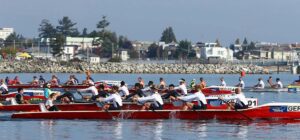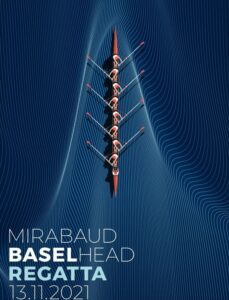Hester rows for Great Britain as lightweight sculler. She won Gold in U23 WL1x in 2005 and was in LW4x the same year winning a Bronze medal; 2006 she was in LW4x winning Bronze again and 2007 in LW2x getting 8th place. She is currently working towards selection for the Olympic Games.
When did you start rowing?
I started rowing at Latymer Upper School in the sixth form. That was why I chose my school. I liked the look of the boats on the river – there was an open day and the boathouse was on the tour. It was dark and you see these white boats and the dark river and it was rather nice.
Don Mclachlan was my coach all the way through. He was at Latymer and when I was and later when I was at University in York he wrote my training programme and coached me in the holidays. I chose Cambridge for my teaching PGCE because he was there [at Jesus College] and coached me there.
I am now in the GB squad system. We are training at Caversham most of the time; we have camps for increasingly large amounts of time under the squad coaches and on the squad programme – Robin Williams is the main lightweight coach and works under Paul Thompson and Darren Whiter does LM2x and occasionally does us too.
There are 7 Lwt women – this is the first time when the whole worlds squad continued onto the next year complete.
What were the key things that enabled you to take a big step forward?
I had a grounding at Latymer in how to train but when I was at University I trained on my own for 3 years doing Don’s programme. He told me I could make the U23 squad in 2 years and medal within 3 years. And I made it in 2 years and medaled. His input has been the only reason why I managed to succeed and my personal “anal” obsession in following the training programme down to the letter.
I was a part of the University of York Boat Club – In my first year I was social secretary and in year 2 I was president. I did the fun side of University rowing as well as train hard. York is an awesome place to train with 5 km river in one way and I have been 15 km the other way and not reached the end. It floods at winter and, apart from Ely and the Thames, it is the longest stretch of row-able water that I know. Flat water allowed me to just get on with it – you don’t need to turn in circles. I had some entertaining moments like when I was going to GB Trials and to wade out to the boathouse during floods just to get my boat to go on the trailer!
I studied Music and told the University in April that I wasn’t going to turn up for the last term of my third year – because I only had coursework not exams this was possible. I told them I needed to be with my coach and on camps and the university said they weren’t happy but couldn’t stop me! I was going to be back for my recital (I am a cellist) and that’s a big part of the degree examination. The recital date was 3 days after the Dorney world cup and I didn’t get a 1st class degree because I didn’t take the cello to the world cup to practice!
What was your U23 year like?
Darren Whiter was running U23 and had a good camp network and a good support system – e.g. We went from selection to Wycliffe for a training camp and he looked after us and organised us all. This was very effective – we were selected early and training in crews from April onwards. It was unique to that year and it may not have continued since. Zac Purchase and I were identified as Lwt single scullers and a WLwt double was chosen. There were only 3 athletes to choose from for those crews. There was some seat racing for a mens 4x and 2x and 2- and the selection was partly down to logistics of where athletes came from. It was an incredibly successful year.
Darren had done lots of other international stuff before but he really showed his organisational skills. He is a very good man manager.
Where are you now?
I didn’t do well at December trials but have since done well being back in the top 2 lwt women. We have doubles races in the next 2 weeks and an erg test on Friday. One incentive is that the top 4 athletes don’t have to do trials in February and I am hoping to be selected in Lwt 2x with Helen Casey for the Olympics.
Helen is physically very strong and her ergos are definitely the best fo the squad – she is 2 seconds ahead of me at present and goes sub 7 minutes for 2km and is pulling 18 km at a split of 2.01. [Hester is 2.03] For the 2k test, my Personal Best score is 7.10 and I am hoping to do 7.08. It will be tough because we have to be 58.5kg now and so I hope to break my PB!
What are your hopes for the future?
If our double had done better than 8th at last year’s world championships I would be more confident in my own selection. We now have to fight every step to get selected to go to the Olympics. I have a 6 month plan and it’s very hard. You have to go over each step before you can get to the massive goal. The next 2 months is about selection. I am determined not going to go to another World Championships or Olympic Games for a marginal result. Getting a marginal result is a very hard experience and teaches you a lot and you know you don’t want to go there again. The boat I am in has got to move. That’s my aim.
What makes a boat move?
On the physiological side – you need two strong people with preferably long levers. But the most important thing for me is technical ability – knowing how to move a boat, feel a boat and feel each other. For lightweights we have to know how to row well because we are the same weight as our opposition; I am one of the taller lightweights, most are 1-2 inches shorter than me. I am sure that physiology and technical ability will set us apart. The only reason I won U23 was because I knew how to row well. I wouldn’t have won it on physiology alone.
Psychologically, you and your partner have to be on a mission – decide what you want to do and get your coach on board and work for it. When you get into a boat, you can try and get it all to work on the way there. Work out how you race well and how the other person races, what fires each of you up, what gets you going in a race.
Psychology is interesting – I never considered it much until this year. I had relied on one coach to tell me what to think and how to do it. Having to rely on myself for the past year I had to develop the skill quickly. Being told what to do is easy if you trust the coach. I have not had an individual coach [since joining the GB squad] but the system looks after you a bit with a load of coaches but you are expected to do a lot on your own.
What inspired you to achieve?
I have always believed I can do anything I wanted if I work hard enough. Sport appealed to me; I was a cellist beforehand and I had focused my life on music. In summary it is dedication and working hard and having one goal. But music never quite appealed as much as sport and rowing has done since. And as a result I didn’t succeed to the fullest extent in music. I know that I can be the best in rowing if I try hard enough, work hard enough and do it for a long enough time. It is all about time as well. I know what I’m looking for in rowing and I know how to get it.
When you wake up on a sunny morning in Seville you think you have a rather good job as you get paid to be there!
Tell us about Rowperfect and how it helped you succeed
[Hester is a long term Rowperfect user] I have used a RP throughout my rowing career from school onwards, always using a computer screen output. We had them in the basement next to the gas boiler at Latymer – and you had to run out to get fresh air! At York I persuaded the committee to apply to the regional rowing commission to borrow their Rowperfects for me to use. I got one of the regional RPs on rotation and another one got lent to the University and they never requested it back. And so I trained on that for three years.
While in Cambridge I was using Jesus College BC’s Rowperfects and doing 5.30 am sessions and not wanting to row on the cam because of crowding from college crews. I used to do half my sessions on the ergo and half on the Rowperfect. Every other day I did 100 minutes with a break to drink at 50 mins. It was usually fartlek or UT2. It is such hard work and so good for you.
Rowperfect for physiology and timing
On an ergo it is static and so you always have a delayed response when you put your foot down – it kicks back slightly. On RP you can really learn how to move a boat. I still use it now: I get my curve upon the screen and try to fill out the back end. And try to hold this through the piece. If I time it well my splits are 10 seconds faster but on a bad day they are 10 seconds slower. It really does tell you when you are rowing like you can do in a boat. I used to do 3 sessions a week – 2 of work and a couple technical.
Reading University BC [where Hester trained before joining the GB squad] has a RP but no computer. Last year Helen and I tried to get together as a crew and we had the cross bar to link two RPs. We used them to try to learn to row together without an interface and the drag was a bit different between the two machines but we used them for a few weeks. The main thing we realised was how differently we rowed the front end of the stroke. We began to time it better. Sitting alongside your partner you can see basic things – when your arms are straight are you moving in the same trajectory. Is the other person doing a different motion that you haven’t seen?
I would quite happily train on one of them rather than anything else. 100 mins on RP is better than battling around a lake…. the squad coaches think you should be able to handle all weathers (including storms) and I think you get more out of a RP session.
My power curve is a work in progress – you can see what I’m doing from the shape – it goes up quite steeply so I connect alright at the catch. The peak isn’t round; it has a bit of a step on the finish, and I push my legs down and then try to haul my back through. I am trying to even this out.
Do you have any advice for young athletes?
I have a thought both with my professional teaching and my rowing which is this. Everyone thinks in this “Generation X” age that everything will come to you on a plate and will be given to them. Young athletes need to work for it or they will never get it. A lot of people will forget that. You have to do everything to the letter and if there is a coach who has produced successful people [and results] and who knows what they are talking about you should do everything that they tell you.
If you cut a corner you won’t win.







